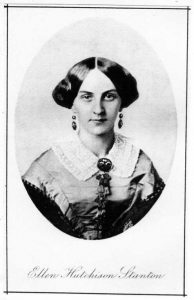
Edwin Stanton’s melancholic wife Ellen
Previously in the novel: War Secretary Edwin Stanton held President and Mrs. Lincoln captive under guard in basement of the White House. He guided his substitute Lincoln through his first Cabinet meeting even though there were some complications. Then he skillfully maneuvered Lincoln’s bodyguard Ward Hill Lamon into believing Lincoln and his wife were in hiding because of death threats.
Stanton entered his home, found the downstairs dark and empty, and proceeded upstairs to his bedroom, where he expected to see his wife, most likely polishing the urn. His steps slowed as he recalled how the death of his son James in February had not sparked the public sorrow and sympathy that did the death of Lincoln’s spoiled boy Willie. His son was a saint compared to the Lincoln brat, but no one gave notice to their grief. Shaking his head to rid it of such feminine thoughts, Stanton tried to tell himself that such slights did not enter into his decision to take control of the government’s executive branch. That would indicate a woman’s emotional disposition in his character, and he would never accept that. When he reached his bedroom door he paused to look in to see his wife Ellen, still wearing black, standing by the fireplace, just staring at the urn. She was fifteen years younger than Stanton and still considered a fine-looking woman of child-bearing age, but in her eyes—her dark, soulful, heavy-lidded eyes—was a silent burden which aged her.
“You’re home.” She kept her gaze on the urn. “You must be hungry.”
“I had a quick supper at the Willard.”
“Very well.”
“It was kind of you to wait up for me.” He stepped into the room, went to her, and lightly touched her shoulder.
“Think nothing of it.”
In the last few months, their conversations had been restricted to courtesies and pleasantries. She rarely smiled, and when she did it was at great emotional cost, as though betraying the memory of her son. This was, of course, all supposition on the part of Stanton, because he had never understood his second wife, unlike his first, Mary, who had been his promise of goodness and light. After Mary died in 1844, three years after their daughter’s death, Stanton had refused the notion of remarriage. Twelve years of aggressively pursuing his law practice and political aspirations had passed before he noticed Ellen Hutchinson, stately, grand, and slightly taller than he. She was quiet, compliant, and sweet in a mysterious manner. Their son James had brought out the sparkle in her eyes, which Stanton had not taken time to appreciate because he had been busy seeking national political power. Now the sparkle was gone.
“Would you care for a cup of warm milk?” Ellen looked at him without emotion.
“No, thank you.”
Could she suspect he was involved in an action that, if discovered, could ruin his career? Stanton wondered as he walked to his armoire, removing his coat. If she did know, would she approve? He softly grunted for worrying about what she would think. What he was doing was for the good of the nation, and he would not change his course now even if she did know and begged him to stop.
“What?” Ellen asked.
“What?”
“I thought I heard a laugh,” she said.
“As Mr. Lincoln says, sometimes one must laugh to keep from crying.”
“Oh.”
Would she care her opinion did not matter to him? Perhaps that was the reason for Ellen’s reserve. She knew her place was behind the deceased wife and children.
“Fine,” Ellen said. “I’ll prepare to retire as well.”
Stanton sat in his large stuffed chair to remove his shoes. He watched her remove the white lace collar and the breast pin from her black silk dress. For all his sorrow and anger that aged him, he reminded himself that he still was only forty-seven years old.
“Did you see Mrs. Lincoln today?” she asked.
“Yes.” Stanton stiffened.
“You don’t like her, do you, Edwin?”
“What makes you think that?”
“The tone of your voice.” She let down her shining hair. “Is she still suffering?”
“Suffering?”
“Mourning.”
“Oh. Yes.”
“I feel sorry for her.”
Her compassion stirred him. The flickering lamp revealed her clear white cheeks to be too cold and stolid. Her pale lips never departed from their downward turn. Suddenly he was aware of his passion for her. Stanton, pulling the suspenders down from his trousers, walked to her.
“I think it’s admirable you’re able to be concerned about Mrs. Lincoln through your own grief.” He paused, hoping for a response. “I don’t want you to be unhappy.”
“I know,” she replied as she combed out her hair. “I don’t want to be unhappy either.”
“I want to make you happy.” He tenderly touched her shoulder.
“You make me happy,” she automatically said.
“Do I truly?”
“Of course.”
Her emotionless tone drained his ardor, and he turned away. Stanton may force his will upon the nation, but not upon his wife.